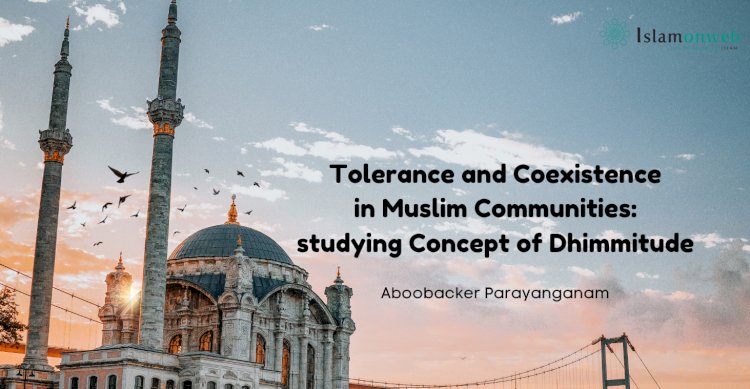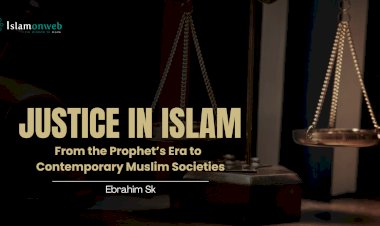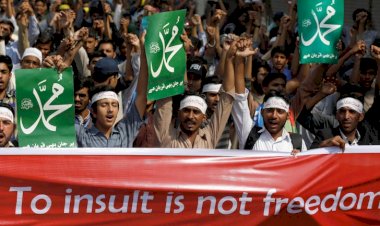Tolerance and Coexistence in Muslim Communities: studying Concept of Dhimmitude
The Muslim community strongly stands for principles of tolerance, compassion, and justice for all citizens, including both Muslims and non-Muslims. Unlike previous societies that often oppressed minorities based on beliefs, Islam introduced these principles, promoting fair treatment. In majority-dominated communities, indigenous minorities frequently face oppression. However, the Muslim community distinguishes itself through its commitment to tolerance and justice. This article explores how the rights of minority indigenous people are upheld in Islam, particularly through the concept of dhimmitude.
Dhimmitude: A Modern Concept of Citizenship
Dhimmitude historically refers to the status of non-Muslims, primarily Jews and Christians, living in an Islamic state. This status grants them protection and certain rights in exchange for specific obligations. Recognized as "People of the Book," dhimmīs are allowed to practice their religions, albeit under legal and social restrictions. The Arabic term dhimma means protection, and dhimmī signifies a protected person, establishing the Muslim community's responsibility to safeguard them. This framework has led scholars like Yūsuf al-Qardhāwi to liken dhimmitude to contemporary citizenship[i].
Historical Background of Dhimmitude
The concept of dhimmitude emerged soon after establishing the Islamic state in the 7th century. The Medina Charter, created by Prophet Muhammad upon his migration to Medina, served as a foundational document for governance in this diverse community. It outlined the rights and responsibilities of all members, including both Muslims and non-Muslims. This concept was further institutionalized during the early caliphate, particularly under Caliph Umar ibn al-Khathāb, who detailed the conditions for non-Muslims in conquered territories. The Pact of Umar (Al Uhda al-Umariyya) specifically defined the rights and obligations of dhimmīs, gaining canonical status in Islamic jurisprudence[ii].
The Umayyad dynasty expanded the Islamic empire, integrating non-Muslims into a society where they could hold administrative and trade positions. During the Abbasid era, a vibrant cultural and intellectual environment flourished as dhimmīs made significant contributions to science, philosophy, and the arts, often occupying vital roles in government and education. The Ottomans further formalized the status of dhimmīs through the millet system, allowing religious communities to govern themselves in personal and communal matters, solidifying dhimmitude’s legacy as a recognized form of citizenship within the Islamic framework[iii].
Dhimmitude in the Qur’an and Sunnah
The Qur’an contains numerous verses illustrating the relationship between Muslims and non-Muslims, particularly the "People of the Book," such as Jews and Christians. A key verse emphasizes this relationship:
“Allah does not forbid you from dealing kindly and fairly with those who have neither fought nor driven you out of your homes. Surely Allah loves those who are fair[iv]”.
This verse calls for kindness and fairness, irrespective of religious differences. Additionally, the Qur’an encourages respectful dialogue with the People of the Book, stating: “Argue not with the People of the Book except in the fairest manner.[v]” The Qur’an also legitimizes sharing meals and marrying pure and pious women from these communities under specific regulations.
Prophet Muhammad explicitly warned against violating the rights of dhimmīs, stating that anyone who wrongs a dhimmi will face his intercession on the Day of Judgment. He declared that “Whoever kills a Mu'ahad will not smell the fragrance of Paradise[vi]”, underscoring the gravity of harming those under protection.
Given these strict directives from Allah and the Prophet, Muslim scholars affirmed the duty to defend dhimmīs. Imām al-Qārāfi cites Imām ibn Hazm, who stated that Muslims must fight enemies targeting dhimmīs, even at the cost of their lives, as neglecting this duty would violate the protection contract. [vii]These teachings highlight the importance of safeguarding the rights and dignity of dhimmīs within Islamic society.
Rights of Dhimmīs in Islamic Society
In Islamic society, dhimmīs were given numerous rights, including security of life, property, and personal dignity, alongside the freedom to practice their beliefs. They were not compelled to convert to Islam and maintained the right to work and earn from their professions. This autonomy allowed dhimmīs to thrive, often taking prominent roles in government and contributing significantly to society.
The Imām, or Muslim ruler, bore the responsibility of protecting dhimmīs from both external threats and internal injustice. Imam al-Qarāfi highlighted that a Muslim ruler should defend dhimmīs against external enemies, even if it endangers the ruler’s own life. Internally, dhimmīs were safeguarded against any harm or aggression from Muslims. Prophet Muhammad himself declared, “Whoever harms a dhimmī, I am his opponent,” emphasizing protection from any mistreatment. Caliphs such as Omar used to ask those who came to him about the state of the dhimmīs whether they were doing well or not[viii] and Ali used to say that dhimmīs are bound to be protected the way the Muslims are[ix]. Scholars, such as Imām Mālik, asserted that killing a dhimmī was a grave offence, with penalties equivalent to those imposed for harming Muslims. Notably, the Caliph Omar bin Abdul Aziz even granted the families of dhimmi, who was killed by a Muslim unjustly the right to seek punishment for the perpetrator[x].
Islam’s respect for dhimmīs extended to their property rights as well. Theft or damage to a dhimmī's property was met with strict penalties, including cutting off the thief’s hand. The sanctity of their possessions was upheld even for items Islam typically viewed as prohibited, like wine. According to Hanafi jurists[xi] a Muslim who destroyed a dhimmī's wine would be fined, acknowledging the dhimmī's belief and right to property.
Religious freedom was a central right for dhimmīs, as enshrined in the Quranic principle that “there is no compulsion in religion[xii]”. This allowed them not only to practice their faith freely but also to establish their places of worship. In an agreement with the people of Īliā, Caliph Omar guaranteed their churches and crosses would be respected and protected[xiii]. General Khāled ibn Walīd also permitted Christians in Ānat to ring church bells freely, with minor restrictions during Islamic prayer times[xiv].
Islamic society’s approach to religious tolerance was thus both principled and practical, allowing dhimmīs a protected status with comprehensive rights. Through these policies, Islam fostered an inclusive community where dhimmīs could live securely, contribute to society, and maintain their religious and cultural identities.
Duties of dhimmī people
In Islamic society, dhimmīs enjoy a range of rights in exchange for fulfilling certain duties. These duties are often misunderstood, sometimes leading to criticisms that they create a form of segregation. However, the obligations placed on dhimmīs were intended to balance mutual responsibilities and rights rather than enforce segregation. Historically, Islam only imposed a few key duties on dhimmīs, primarily related to taxes, adherence to civil laws, and respecting Islamic religious practices[xv].
One of the most debated obligations is the jizya, an annual tax levied on able-bodied adult men among the dhimmīs. Women, children, elderly individuals, and those unfit for military service are exempt from this tax[xvi]. The purpose of the jizya is twofold: it acknowledges the dhimmīs' acceptance of Muslim governance and serves as compensation for their exemption from military duty, which is mandatory for Muslims. Therefore, the jizya contributes toward the collective defence expenses, supporting the same protection Muslims receive through military service. The amount is determined by the local ruler, taking into account the financial capacity of each individual. For example, Caliph Omar instituted a graded jizya system based on social class: 48 dirhams for the upper class, 24 for the middle, and 12 for the lower class, ensuring that the tax burden was manageable and fair.[xvii] If the state could not provide protection, it would return the collected jizya, as evidenced by an incident where General Abu Ubaidah refunded the tax to Syrian citizens when the military could no longer ensure their security. Additionally, if dhimmīs chose to join Muslims in defence efforts, they would be exempt from the jizya.
A secondary duty involves a commercial tax on goods transported across borders, similar to today’s customs tax. This tax was initiated by Caliph Omar and applied only to the commercial profits of dhimmīs, which were otherwise untaxed[xviii]. Unlike Muslims, who are obligated to pay zakāt on various forms of wealth, the dhimmīs were only taxed on funds used in cross-border commerce. This policy ensured equity and financial contribution while respecting the distinct obligations of Muslims and non-Muslims.
Dhimmīs were also expected to observe Islamic civil and criminal laws. As citizens of the Islamic State, they were bound to the laws governing financial transactions and criminal behaviour, such as theft or murder, which maintained public order and ensured that justice was applied uniformly. However, Islamic law made allowances for their religious practices. Dhimmīs were not restricted from consuming pork, alcohol, or other items permissible in their religions, even if forbidden in Islam, underscoring the state’s commitment to respecting their religious freedom.
Finally, dhimmīs were encouraged to respect Islamic customs and practices in the public sphere. They were asked not to openly engage in actions that might offend the sentiments of the Muslim majority, such as drinking alcohol or consuming pork publicly, especially during Ramadan. This guideline sought not to limit dhimmīs’ personal freedoms but rather to maintain a respectful coexistence in a way that would not disrupt social harmony.
These obligations, rather than being oppressive, were designed to ensure a balanced and respectful relationship between Muslims and non-Muslims in the state. By contributing through the jizya and respecting public Islamic practices, dhimmīs retained their religious freedom and received full protection from the state, reflecting a system that, at its core, aimed to integrate and protect diverse communities.
Manifestation of Tolerance in Islamic History
Islamic history is marked by remarkable instances of tolerance and coexistence that are unparalleled in human history. Non-Muslims, known as dhimmīs, experienced significant freedom and prosperity under Islamic rule in regions like Andalusia and Egypt. Many Western scholars have documented this unique atmosphere of tolerance and coexistence.
The foundation of Muslim tolerance is rooted in the belief in human dignity, irrespective of religion, nationality, or beliefs. The Qur’an states, “And We have honoured the children of Adam[xix]” which underscores this principle. An example of this is when Prophet Muhammad sent aid to the people of Mecca during a drought[xx], despite their previous oppression of him and his followers. He honoured relationships with Jews and Christians, even allowing a Christian delegation from Najrān to pray in his mosque.
One notable instance of tolerance occurred when Caliph Omar encountered an elderly dhimmi begging for alms. Understanding that age had led him to this situation, Omar brought him to the Muslim treasury and ensured he received adequate support. This commitment to welfare exemplified the Islamic principles of compassion and justice.
Islamic tolerance extended to allowing non-Muslims to hold state positions. Notably, Muāwiyah Ibn Abī Sufyān employed a Christian scribe named Sarjūn[xxi]. During the Abbasid era, Christians like Nasr Ibn Harūn and Isa Ibn Nestorius occupied significant government roles. The presence of non-Muslims in administration impressed observers such as Adam Smith, who noted the diverse workforce in the Islamic state. This environment led Egyptian poet Hassan Ibn Khāqan to poetically proclaim the superiority of the Jewish community, encouraging others to embrace Judaism, reflecting the extraordinary tolerance that characterized Islamic governance during that time.
Conclusion
The concept of dhimmitude in Islamic communities reflects a strong commitment to tolerance, coexistence, and the protection of minority rights. Rooted in the teachings of the Qur'an and the practices of Prophet Muhammad, it promotes harmonious relationships between different religious groups. Islamic governance historically integrated non-Muslims into society, allowing them to thrive in various roles. While dhimmīs had obligations like the jizya, these were intended to support common defence while safeguarding their autonomy and religious freedom, promoting peaceful coexistence.
About the author;
Aboobacker Parayanganam is currently studying at the Muḥammad Al-Sādis Institute for Murshidīn in Morocco. He holds a Master’s Degree from the Department of Translation and Comparative Literature at Darul Huda Islamic University and a Bachelor’s Degree in English Literature from Calicut University. He has previously worked as a teacher at Darul Irshad Academy in Kasargod.
[i]Al-Qaradawi, Y. (1992). Ghair al-Muslimīn fi al-mujthama al-Islāmi [Non-Muslims in the Islamic Community] (3rd ed.). Makthaba Vahba Publications.
[ii] Boston University. (2024). Islam and the Jews: The Pact of Umar, 9th Century CE. Retrieved April 7, 2024, from https://www.bu.edu
[iii] Faroqhi, S. (2009). The Ottoman Empire: A Short History. Markus Wiener Publishers.
[iv] Qur'an. Sura al-Mumthahina [Verse 8].
[v] Qur'an. Sura al-Ankabūt [Verse 46].
[vi] Sunan Ibn Mājah. Hadith 2686.
[vii]Al Fūrūq by al Imām Qārāfi, third volume, page 14. ālam al-Kuthub publications، without date of edition۔
[viii] Al-Tabarī, M. (1967). Tārīkh al-Ṭabarī [History of al-Ṭabarī] (Vol. 4, p. 89). Dār al-Ma'rif publication.
[ix] Ibn Qudāma, A. (1997). Al-Mughnī [The comprehensive] (Vol. 13, p. 49). Dār ālam al-Khuthub for publication.
[x] Abdul Razzaq, A. (2013). Al-Musannaf (Vol. 9, p. 302). Dār Tha'seel publications.
[xi]Al-Qaradawi, Y. (1992). Ghair al-Muslimīn fi al-mujthama al-Islāmi [Non-Muslims in the Islamic Community] (p. 15, 3rd ed.). Makthaba Vahba Publications.
[xii] Qur'an. Sura al-Baqara [Verse 256]
[xiii] Al-Tabarī, M. (1967). Tārīkh al-Ṭabarī [History of al-Ṭabarī] (Vol. 3, p. 609). Dār al-Ma'rif publication.
[xiv] Abu Yūsuf, Al-Kharāj [Page 160]. publisher: Al-Azhar Heritage Library.
[xv] Al-Qaradawi, Y. (1992). Ghair al-Muslimīn fi al-mujthama al-Islāmi [Non-Muslims in the Islamic Community] (p. 34, 3rd ed.). Makthaba Vahba Publications.
[xvi] Ibn al-Qayyim, Ahkām ahl al-dhimma [Volume 1, Page 149]. publisher: Dār Ibn Hazm, Beirut second edition 2021
[xvii] Ibn al-Qayyim, A. (2021). Ahkām ahl al-dhimma [The rulings on the people of dhimma] (Vol. 1, p.132). Dār Ibn Hazm.
[xviii] Ibn al-Qayyim, A. (2021). Ahkām ahl al-dhimma [The rulings on the people of dhimma] (Vol. 1, p.329). Dār Ibn Hazm.
[xix] Qur'an. Sura al-Isra [Verse 70].
[xx] Al-Sarakhsi, A. (1971). Sharḥ al-Siyar al-Kabīr [The great explanation of the law of war] (p. 96). Eastern Advertising Company.
[xxi] Al-Qaradawi, Y. (1992). Ghair al-Muslimīn fi al-mujthama al-Islāmi [Non-Muslims in the Islamic Community] (p. 24, 3rd ed.). Makthaba Vahba Publications.
Disclaimer
The views expressed in this article are the author’s own and do not necessarily mirror Islamonweb’s editorial stance.
























Leave A Comment